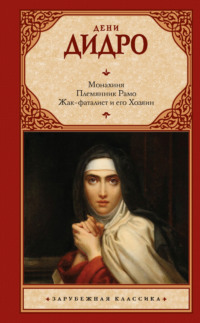 полная версия
полная версияLes Bijoux Indiscrets, or, The Indiscreet Toys
Thus harangued Orcotomus, promising to himself nothing less than to raise the Toys to the level of the windpipes of one of his learned brethren, whose success jealousy had attack'd in vain.
CHAP. X.
Less learned and less tedious than the preceding. Continuation of the academical sitting
By the difficulties started against Orcotomus, before he could make his experiments, it appeared, that his notions were judged to have less of solidity than ingenuity. "If Toys have the faculty of speech naturally," say they, "why have they not made use of it till now? If it was an effect of the goodness of Brama, who has been pleased to endow women with so strong a desire of talking, to double the organs of speech in them; it is very strange, that they have so long been ignorant of, or at least neglected this valuable gift of nature. Why has not the same Toy spoke more than once? Why has none of them spoke of aught but the same subject? By what mechanism does it fall out, that one of the mouths is forcibly kept shut, while the other speaks? Moreover," added they, "if we judge of the prattle of Toys by the circumstances, in which most of them have spoken, and by the things they have told; there is all the reason in the world to believe it involuntary, and that those parts would continue mute, if it had been in the power of their possessors to impose silence on them."
Orcotomus arose to answer these objections, and insisted that Toys talk'd in all ages; but so low, that what they said was hardly heard, even by those to whom they belonged. That it is not surprizing, that they have raised their voice in our days, when the freedom of conversation is carried so high, that one may without impudence and indiscretion converse on those things, which are the most familiar to them: that if they have spoke audibly but once, we are not to infer that that will be the only time. That there is a vast difference between being mute and keeping silence; that if they have talk'd but on one and the same subject only, probably the reason is, that it is the only one, of which they have ideas. That those who have not spoke as yet, will speak. That if they remain silent, it is because they have nothing to say, or that they are ill made, or want ideas and terms.
"In a word," continued he, "to pretend that it was an effect of the goodness of Brama to grant to women the means of gratifying their strong desire of talking, by multiplying in them the organs of speech; is to grant, that if this benefaction drag'd any inconveniences after it, it was an effect of his wisdom to prevent them: and this he has done, by compelling one of the mouths to keep silence, while the other speaks. It is already but too inconvenient for us, that women change their mind from one instant to another: what then would it have been, if Brama had left them the power of being of two contradictory sentiments at the same time? Further, the gift of speech has been given, purely in order to be understood; but the women, who find it a difficult talk to understand one another with a single mouth each, how could they possibly do it, if they spoke with two at a time?"
Thus Orcotomus answered several things, and thought he had given satisfactory solutions to all difficulties: but he was mistaken. New doubts were raised, and he was on the point of sinking under them; when Cimonazes came to his assistance. Then the dispute became tumultuous. They stray'd wide of the question, they bewilder'd themselves, they return'd, they bewilder'd themselves a second time, they grew angry, they brawled; from brawling they pass'd to injurious words, and the academical sitting ended.
CHAP. XI.
Fourth trial of the Ring.
The Echo
While the prattle of the Toys employed the academy, in other companies it became the news of the day, and the subject of the morrow, and of several succeeding days. It was an inexhaustible text. True facts were blended with false; every thing went down, the prodigy had removed all incredulity. In conversation people lived on it upwards of six months.
The Sultan had made but three trials of his ring; and yet, in a circle of ladies who were allowed a stool at the Manimonbanda's, one of them related a discourse held by the Toy of a president's lady, next that of a marchioness, then she disclosed the pious secrets of a devotee, in fine those of several women who were not there: and God knows the stories that were father'd on their Toys; nor was there any parcimony of smutty tales. From facts they came to reflections. "I must confess," says one of those ladies, "that this witchcraft (for it is a spell cast on Toys) keeps us in a cruel state. How! to be eternally under apprehensions of hearing an impertinent voice issuing from one's self." "But madam," answered another, "this fright astonishes us with regard to you. When a Toy has nothing ridiculous to tell, what does it signify, whether it be silent or speak?" "It signifies so much," replied the first, "that I would freely give half my jewels, to be assured that mine will never speak." "Surely," replied the second, "there must be substantial reasons for keeping measures with people, to purchase their discretion at so high a price." "I have not better reasons than another," said Cephisa: "and yet I do not eat my words. Twenty thousand crowns, is not too large a sum to buy tranquillity: for I will frankly own, that I have not more confidence in my Toy than in my mouth, and many silly things have slipt from me in my life. I hear every day so many incredible adventures unveiled, attested, detailed by Toys, that even retrenching three fourths, the remaining part is sufficient to destroy a reputation. If mine should prove but half so great a lyer as all those, I should be ruined. Was it not enough then that our conduct was in the power of our Toys, without our reputation being dependent on their discourses?" "For my part," answered Ismene smartly, without entering into endless arguments, "I allow things to go their own way. If it be Brama, that has given the faculty of speech to Toys, as my Bramin has convinced me, he will not suffer them to lye. It would be impious to assert the contrary. Wherefore my Toy may talk as often and much as it will. But after all what will it say?"
Then was heard a hollow voice, which seemed to come out of the ground, and answered by way of Echo: Many things. Ismene, not imagining whence the answer proceeded, flew into a passion, attack'd her neighbours, and increased the diversion of the company. The Sultan, charmed with her mistake, quitted his minister, with whom he was in conference in a corner, went to her, and said: "I am afraid, madam, you have heretofore admitted some one of these ladies into your confidence, and that their Toys are so malicious as to recollect histories, which your own might have forgot."
At the same time, by moving his ring up and down with dexterity, Mangogul caused a very singular dialogue between the lady and her Toy. Ismene, who had always conducted her little affairs well enough, and had never had a confidante, answer'd the Sultan, that all the art of calumniators would be ineffectual. "Perhaps," answer'd the unknown voice. "How, perhaps," reply'd Ismene, piqued at this injurious doubt, "what have I to fear from them?" "Every thing, if they knew as much as I." "And what do you know?" "Many things, I tell you." "Many things, that says much, but means nothing. Can you tell any particulars?" "Without doubt." "And of what nature? Have I been really in Love?" "No." "Have I had intrigues, adventures?" "Exactly." "And with whom, pray? With Petits-maitres, military men, senators?" "No." "Comedians?" "No." "You shall see, it was with my pages, my footmen, my confessor, or my husband's chaplain." "No." "Mr Impostor, you are at your wits end?" "Not quite." "Yet I can see no other person, with whom one can possibly have adventures. Was it before, was it after my marriage? Answer me then, impertinent." "Ah, madam, spare invectives, if you please. Compel not the best of your friends to take some disagreeable steps." "Speak, my dear, tell, tell all. I value your services as little as I fear your indiscretion. Explain your self: I not only give you full permission, but even dare you to it." "To what do you reduce me, Ismene?" said the Toy, breathing a deep sigh. "To render justice to vertue." "Well then, virtuous Ismene, have you quite forgot young Osmin, the sangiac Zegris, your dancing master Alaziel, your music master Almoura?" "Ah! what horrid calumnies," cried Ismene. "I had a mother, who was too vigilant to expose me to such irregularities: and my husband, were he here, would testify that he found me just such as he could wish." "Very true," replied the Toy, "thanks to the secret of your intimate friend Alcina."
"This is so extravagantly and so grossly ridiculous," said Ismene, "that it deserves no refutation. I cannot say," continued she, "which of these ladies Toys it is, that pretends to be so knowing in my affairs: but it has related things, of which my own does not know a syllable." "Madam," answered Cephisa, "I can assure you, that mine has gone no farther than giving ear." The rest said as much, and they sate down to play, without precisely knowing the interlocutor of the conversation above related.
CHAP. XII.
Fifth Trial of the Ring.
Play
Most of the ladies who made the party with the Manimonbanda, play'd with great eagerness; and it was not necessary to have Mangogul's sagacity, to perceive it. The passion of gaming is one of those that puts on the least disguise. It shews itself, whether in winning or losing, by strong symptoms. "But whence proceeds this fury?" said he within himself. "How can the ladies bear to pass whole nights round a Pharaoh table, to tremble in expectation of an ace or a seven? This phrensy injures their health and beauty, when they have any: without reckoning the disorders into which I am sure it precipitates them. I have a great desire," said he to Mirzoza in the ear, "to execute here a thought just come into my head." "And what is this fine thought, which you meditate?" said the favorite. "It is," answered Mangogul, "to turn my ring on the most unbridled of these brelandiers, to interrogate her Toy, and to transmit by that organ, a good advice to all those weak husbands, who allow their wives to stake the honour and fortune of their house on a card or a dye."
"I like this notion mightily," replied Mirzoza; "but know, Prince, that the Manimonbanda has just now sworn by her Pagoda's, that she would keep no more drawing-room nights, if ever she found herself again exposed to the impudence of Engastrimuthes." "What have you said, my soul's delight?" interrupted the Sultan. "I have," answered the favorite, "made use of the name, which the modest Manimonbanda gives to all those, whose Toys have the faculty of speech." "It is of the invention of her stupid Bramin, who values himself upon knowing the Greek, and being ignorant of the Congese language," replied the Sultan. "However, with the Manimonbanda's leave, and that of her chaplain too, I would desire to question Manilla's Toy; and it would be proper to make the interrogatories here, for the edification of the neighbours." "Prince," said Mirzoza, "if you take my word, you will spare the Manimonbanda the uneasiness this proceeding must give her: which you may do, without balking your own curiosity or mine. Why do you not go to Manilla's house?" "I will go, since you advise," said Mangogul. "But at what hour?" said the Sultana. "About midnight," answered the Sultan. "At midnight she is at play," said the favorite. "I will put off my visit then till two in the morning," replied Mangogul. "Prince, you don't consider," rejoined the favorite: "'tis the most pleasant hour of the four and twenty for female gamesters. If your highness will be led by me, you will take Manilla in her first sleep, between seven and eight."
Mangogul followed Mirzoza's advice, and visited Manilla about seven. Her women were going to put her to bed. He judged by the sadness predominant in her countenance, that she had play'd with bad luck. She walk'd to and fro, stopp'd, lifted her eyes to heaven, stamp'd with her foot, cover'd her eyes with her hands, and muttered somewhat, which the Sultan could not understand. Her women, who were undressing her, followed all these motions in panicks; and if they at length compassed getting her into bed, it was not done without receiving harsh language and something worse. Now Manilla is in bed, having made no other night prayer, but some curses against a damned ace, which came seven times successively to her loss. Scarcely had she closed her eyes, when Mangogul levell'd his ring at her. Instantly her Toy exclaimed in a sorrowful tone: "Now I am repiqued and capotted." The Sultan smiled to hear that every thing about Manilla, even to her Toy, spoke gaming. "No," continued the Toy, "I will never play against Abidul: he knows nothing but tricking. Speak to me no more of Dares: with him one runs the risq of some unlucky hits. Ismal is a pretty fair player, but every body has him not that would. Mazulim was a treasure, before he fell into the hands of Crissa. I don't know a more whimsical player than Zulmis. Rica is less so; but the poor lad is run dry. What can one do with Lazuli? The prettiest woman of Banza could not make him play high. What a piddling player Mollius is! In truth, desolation has spread among the gamesters: and e'er long we shall not know with whom to make a party."
After this Jeremiad, the Toy fell to relating uncommon strokes, of which it had been a witness; and excessively extoll'd the constancy and resources of its mistress in bad luck. "Were it not for me," it said, "Manilla would have ruin'd herself twenty times over. All the Sultan's treasures would not have discharged the debts that I have paid. In one match at breland she lost to a farmer of the revenue and an abbé, above ten thousand ducats. She had nothing left but her jewels: but her husband had so lately redeem'd them, that she dared not to venture them. Nevertheless she took the cards, and had one of those seducing hands, which fortune sends, when she is on the point of cutting your throat. They urged her to speak. Manilla look'd at her cards, put her hand into her purse, whence she was sure to pull nothing, return'd to her cards, examined them again, but without determining. 'Does madam stand it at last?' said the farmer. 'Yes; I stake,' said she, – 'I stake – I stake my Toy.' 'For what value?' replied Turcares. 'For a hundred ducats,' said Manilla. The abbé withdrew, esteeming the Toy too high rated. Turcares declared at it: Manilla lost and paid.
"The silly vanity of possessing a titled Toy got the better of Turcares. He offered to supply my mistress with play-money, on condition that I should be subservient to his pleasures. The bargain was struck in a moment. But as Manilla play'd high, and the farmer was not inexhaustible, we soon saw the bottom of his coffers.
"My mistress had appointed a most brilliant party at Pharaoh. All her acquaintance were invited. They were to punt with nothing under ducats. We depended on the purse of Turcares. But the morning of this great day, the rascal wrote us word that he had not a penny, and left us in the utmost consternation. However, we must extricate ourselves, and there was not a moment to be lost. We pitch'd on an old chief of the Bramins, to whom we sold at a dear rate some complaisances, which he had sollicited a long time. This sitting cost him double the income of his ecclesiastical preferment.
"Turcares returned notwithstanding, in a few days. He said he was excessively concerned that madam had taken him at a nonplus: he still reckon'd on her goodness. 'Indeed you reckon ill, my dear,' replied Manilla: 'I cannot with decency receive you more. When you were in a condition to lend, the world knew why I admitted you: but now that you are good for nothing, you would blast my honour.'
"Turcares was piqued at this discourse, and so was I: for he was perhaps the best lad in Banza. He waved his usual politeness, and gave Manilla to understand, that she cost him more than three opera girls, who would have amused him better, 'Alas!' cried he most mournfully, 'why did I not stick to my little milliner? She loved me to folly. I made her so happy with a silk gown.' – Manilla, who did not relish comparisons, interrupted him in a tone, eno' to make one tremble, and bade him begone in an instant. Turcares knew her, and chose rather to return peaceably down stairs, than to leap thro' the window.
"After that, Manilla borrowed of another Bramin, who came, said she, to administer comfort in her afflictions. The holy man succeeded the farmer of the revenue, and we reimbursed him his comforts in the same coin. She lost me several times more, and 'tis well known that play-debts are the only ones that are paid among the Beau Monde.
"If Manilla happens to play with good luck, she is the most regular woman in Congo. Excepting her play, she takes surprising care of her conduct: she is never heard to swear an oath: she entertains well: she pays her mercer and other tradesmen, is liberal to her servants, redeems her nicknacks sometimes, and caresses her lap dog and her husband: but thirty times a month she risks these happy dispositions and her money on an ace of spades. Such is the life she leads, and will lead: and God knows how many times yet I shall be pawn'd."
Here the Toy ceased, and Mangogul went to take repose. He was awaken'd at five in the afternoon, and went to the opera, according to a promise made to the favorite.
CHAP. XIII.
Of the opera at Banza.
Sixth trial of the Ring
Of all the public diversions of Banza, none supported itself but the opera. Utmiutsol and Utremifasolasiututut, two celebrated musicians, one of whom was growing old, and the other was but just new-fledged, alternately occupied the lyric scene. Each of these two original authors had his partisans. The ignorant and the grey-bearded dotards stood up for Utmiutsol; the smart young fellows and the Virtuosi were for Utremifasolasiututut: and the people of taste, as well young as old, held them both in high esteem. Utremifasolasiututut, said the latter, is excellent when he is good, but he sleeps at times; and, pray, to whom does not that happen? Utmiutsol holds up better, and is more uniform. He is full of beauties; yet he has not one, of which there are not examples to be found, and even more striking, in his rival; in whom there are strokes to be observed, which are entirely his own, and are not to be met with any where but in his works. Old Utmiutsol is simple, natural, smooth, sometimes too smooth, and that is his fault. Young Utremifasolasiututut is singular, brilliant, composed, learned, sometimes too learned: but perhaps that is his hearer's fault. The one has but one opening, beautiful indeed, but repeated at the head of all his pieces. The other has made as many openings as pieces, and they all pass for masterpieces. Nature guided Utmiutsol in the ways of melody; study and experience discovered the sources of harmony to Utremifasolasiututut. Who ever knew how to declaim, and who will ever speak a part like the old man? Who will compose light catches, voluptuous airs, and symphonies in character like the young one? Utmiutsol is the only person who understood dialogue. Before Utremifasolasiututut no body distinguished the delicate touches, which separate the tender from the voluptuous, the voluptuous from the passionate, the passionate from the lascivious. Nay some partisans of the latter pretend, that if Utmiutsol's dialogue is superior to his, this is not so much owing to the inequality of their talents, as to the difference of the poets, whom they made use of. "Read, read," cried they, "the scene of Dardanus, and you will be convinced, that if we give good words to Utremifasolasiututut, Utmiutsol's charming scenes will be revived." However that be, in my time, the whole town flock'd to the tragedies of the latter, and people stifled one another at the interludes of the former.
They were just then exhibiting in Banza an excellent piece of Utremifasolasiututut, which would never have been represented but in nightcaps, had not the favorite Sultana had the curiosity to see it. And besides, the periodical indisposition of Toys favored the jealousy of the fiddles, and made the principal actress flinch. She, who supplied her place, had not so good a voice, but as she made amends by her manner of acting, nothing hindered the Sultan and the favorite from honouring the piece with their presence.
Mirzoza was already come, Mangogul comes, the curtain is raised, they begin. Every thing went on marvellously well: Miss Chevalier had effaced the memory of Miss le Maure, and they were at the fourth act, when the Sultan bethought himself, in the middle of a chorus, which he thought lasted too long, and had already cost the favorite two yawns, to point his ring on all the singers. Never was there seen on the stage so odd and comical a sight. Thirty women were struck dumb on a sudden. Their mouths were wide open, and they kept the same theatrical attitudes they held before. And at the same time their Toys made their throats sore with the violence of singing, this a Pont-neuf, that a Vaudeville polisson, another a very indecent parody, and all of them extravagances relative to their characters. On one hand was heard, oh vraiment ma comere, oui; on the other, quoi douze fois? Here, qui me baise, est-ce Blaise? There, rien, Pere Cyprien, ne vous retient. In fine, they all wound themselves up into a strain, so high, so rude, and so mad, that they formed the most extravagant brawling ridiculous choir, that had been heard before and since that of – no – d – on —
Here the manuscript was worm-eaten.
All this while the Orchestra went on, and the loud laughs of the pit and boxes joined to the sound of the instruments, and the singing of the Toys, compleated the cacophony.
Some of the actresses, fearing lest their Toys, tired with quavering impertinences, might resolve to speak them out, ran behind the scenes: but they escaped with the fright only. Mangogul being perswaded that the public would learn nothing new, turn'd off his ring. In an instant all the Toys were silent, the bursts of laughter ceased, the audience grew calm, the play was resumed and finished peaceably. The curtain drop'd, the Sultana and Sultan went off, and the Toys of our actresses went to their several appointments, where they were to have a different employment from singing.
This affair made a great noise. The men laugh'd, the women were alarmed, the Bonza's were scandalized, the academicians rack'd their brains about it. But what did Orcotomus say? Orcotomus triumph'd. He had hinted in one of his memoirs, that the Toys would infallibly sing: they had sung accordingly, and this phænomenon, which disconcerted his brethren, was to him a new ray of light, and compleated the confirmation of his system.
CHAP. XIV.
Orcotomus's experiments
It was on the fifteenth of the moon of – , that Orcotomus had read his memoir to the academy, and communicated his thoughts on the tattle of the Toys. As he then did with the greatest assurance promise to produce infallible experiments, which he had repeated several times, and always with success; the majority of people was struck with his doctrine. For some time the public preserved the favorable impressions they had received: and for full six weeks Orcotomus pass'd for having made considerable discoveries.
Nothing was wanting to complete his triumph, but performing before the academy the famous experiments, which he had preached so loudly. The assembly that met on this occasion was extremely brilliant. The ministers of state graced the meeting: the Sultan himself did not disdain to be there, but invisible.
As Mangogul was a great Monologue maker, and the futility of the conversations of his time had tainted him with the habitude of soliloquy: "Either Orcotomus," said he, "must be an arrant quack, or the Genius my protector, a great fool. If the academician, who certainly is not a conjurer, can restore speech to dead Toys; the Genius who protects me was in the wrong to make a compact, and sell his soul to the devil, for the sake of communicating it to Toys full of life."









